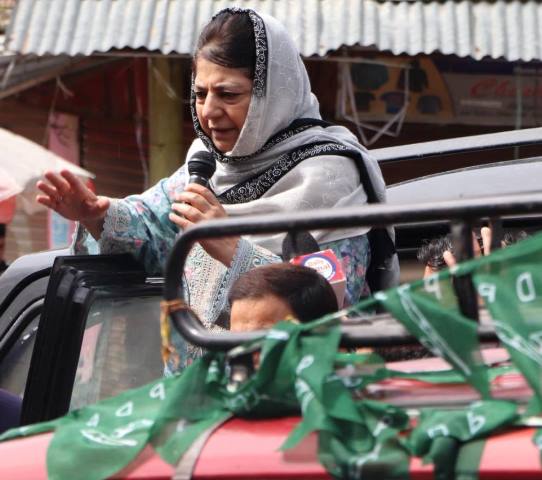Mehbooba Mufti warns of environmental & economic disaster by destruction of trees, orchards in Kashmir
On highway roads and unplanned railway Projects
18/12/2024

Srinagar, December 18 (KIP)-Former Chief Minister and PDP President Mehbooba Mufti has raised serious concerns regarding the proposed 3,300 crore Rajouri-Baramulla Highway Project, calling it a potential “environmental and economic disaster in the making.” The highway, planned to connect Rajouri in Jammu to Baramulla in Kashmir through the fragile Pir Panjal range, has sparked debates over its ecological and social consequences.
Mehbooba Mufti, addressing the media, said, “While we welcome infrastructure development in Jammu & Kashmir, it cannot come at the cost of our environment and the livelihoods of our people. This highway cuts through some of the most eco-sensitive zones in the Pir Panjal range and pristine tourist spots like Yousmarg, Doodhpathri, and Kellar Shadimarg. Projects like these, if pursued recklessly, will trigger ecological disasters similar to Joshimath.”
The project, which runs parallel to the existing Mughal Road, has been assigned to the Border Roads Organisation (BRO). However, Mufti questioned the need for such duplication and criticized the government for failing to address the environmental impacts.
“We have already invested heavily in the Mughal Road to connect Poonch, Rajouri, and Shopian. What purpose does a parallel highway serve, except to put unnecessary pressure on the environment and public funds? This decision reflects a lack of planning and disregard for the fragile ecology of Jammu & Kashmir,” Mehbooba remarked.
The highway will pass through districts of Poonch, Shopian, Pulwama, Budgam, and Baramulla, directly impacting forested zones, agricultural land, and ecotourism hubs. Environmentalists have warned that the construction could lead to deforestation, land degradation, and increased risk of landslides, posing a serious threat to the region’s biodiversity.
Drawing parallels to the Joshimath disaster in Uttarakhand, Mehbooba Mufti highlighted the consequences of unplanned infrastructure development in the Himalayas. “We have already seen the tragic outcomes of neglecting environmental safeguards in Joshimath. Thousands of trees were felled for infrastructure projects there, causing towns to sink and livelihoods to collapse. We cannot allow the same mistakes to be repeated in Jammu & Kashmir,” she said.
She further demanded a comprehensive Environmental Impact Assessment (EIA) before proceeding with the project. “It is imperative that the government conducts an independent and transparent EIA. The voices of local communities, environmental experts, and stakeholders must be taken into account before bulldozing through our natural resources.”
Highlighting the economic implications, Mehbooba warned that the project would severely impact ecotourism and horticulture, which are vital to the region’s economy. “The regions of Yousmarg, Doodhpathri, and Magam are not just ecological treasures but also economic lifelines for thousands of families. This project, in its current form, risks destroying their livelihoods.”
Calling for a more sustainable development approach, Mehbooba Mufti reiterated her party’s stand that infrastructure projects must prioritize the interests of the people. “We are not against development, but development must be sustainable and inclusive. Projects imposed without consultations only serve to alienate people further.”
On the proposed construction of satellite townships Ms. Mufti has has raised concerns over the government’s proposal to construct 30 satellite townships along the Srinagar Ring Road, a project that would require approximately 1.2 lakh kanals (15,000 acres) of land, predominantly prime agricultural and horticultural areas. She added highlighted the adverse impact on local farmers, particularly in Budgam district, where 17 villages are expected to be significantly affected. She emphasized that the acquisition of fertile land for urban development threatens the livelihoods of those dependent on agriculture and horticulture, sectors that form the backbone of Kashmir’s economy. “This is a land-deficit region, and such plans violate the Srinagar Master Plan and the government’s land-use policy,” Mufti stated, questioning the necessity and intended beneficiaries of these townships. She urged the government to provide clarity on the purpose of these developments. “If the townships are to decongest the Srinagar city where four or more families live in a single house it’s a welcome step , we appreciate, why is government silent on who it’s stakeholders are and implementation ,she asked.
On Railway Network expansion Ms. Mufti, raised strong concerns over the government’s relentless push for multiple new railway lines in Kashmir, warning of devastating consequences for the region’s fragile ecology and local livelihoods.
“While improved connectivity is important, the blind expansion of railway infrastructure such as doubling the Baramulla-Banihal section and proposing new lines especially through Shopian, and Pahalgam comes at a grave cost to Kashmir’s environment,” Mufti stated.
She criticized the government’s priorities, asserting that such large scale projects under the garb of “development” appear to serve interests beyond the local population. “Why is the government so eager to dangerously alter the landscape of Kashmir without assessing the irreversible environmental damage. This fragile ecosystem sustains local livelihoods, and reckless decisions threaten to destroy the very foundation of our economy and natural beauty,” she said.
Mufti underscored that development cannot come at the expense of Kashmir’s future. “True progress respects the balance between growth and environmental preservation. The government must address why these projects are being forced on Kashmir without adequate consultation or concern for longterm consequences.”